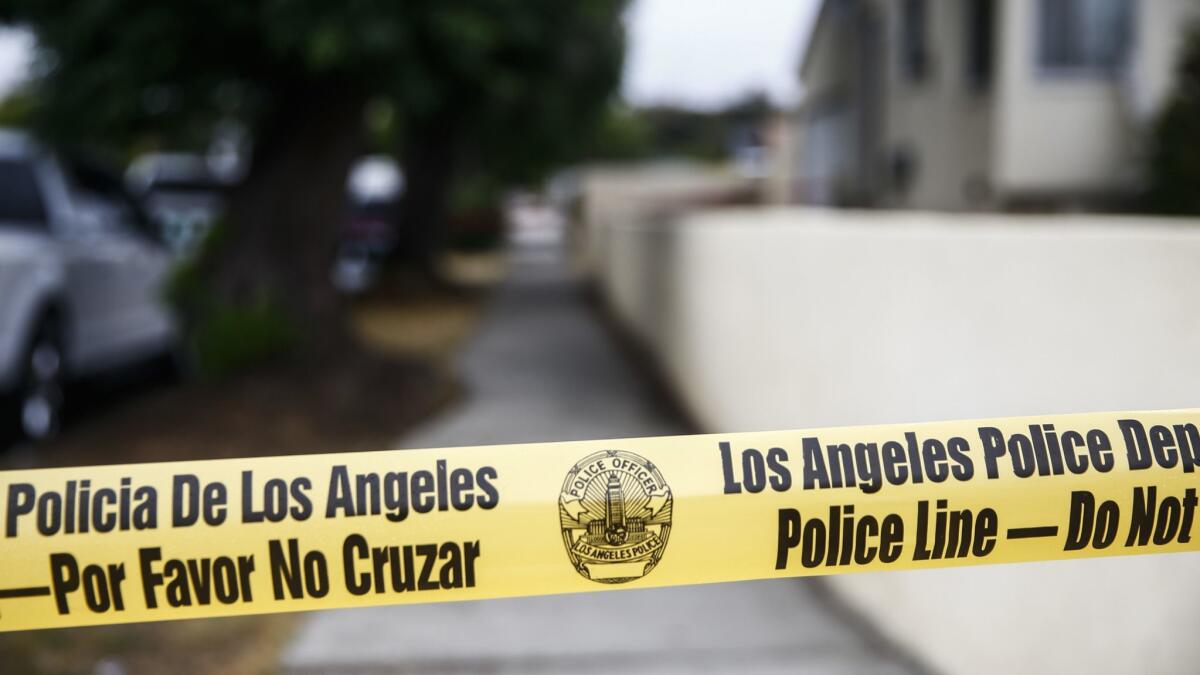Op-Ed: Police unions are trying to pull the blinds on officer shootings

- Share via
California took an important step toward police accountability last year when the Legislature passed SB 1421, which for the first time required that records of police shootings and other uses of force be made public. The bill also opened up records of cases in which officers were investigated for dishonesty or sexual assault.
Now police unions are trying to thwart the law.
Those same unions first tried to keep the bill from becoming law by lobbying legislators and, when that failed, by urging Gov. Jerry Brown to veto it. They lost – a rare setback for a lobby used to getting its way in Sacramento.
Having failed to win on the merits, the unions now are trying a novel – and intellectually dishonest – end run to get back what they lost with two branches of government by trying to snooker the third. In court cases up and down California, lawyers for police unions are maintaining that the law applies only to new records created after the law took effect, not to existing ones. If they are successful, records generated by California police departments before the bill became law would not be public.
In court cases up and down California, lawyers for police unions are maintaining that the law applies only to new records created after the law took effect.
There always will be rare instances where records related to allegations of police misconduct will need to be withheld from the public. There are cases, for instance, where revealing those records might compromise important criminal investigations, or where the identities of police informants might be disclosed, causing them danger. But the law has exemptions for such circumstances, and it is a crucial tool for keeping police accountable.
Angered by police shootings across the country, activists have demanded that law enforcement be more transparent about how such incidents are investigated and how disciplinary decisions are made. The records SB 1421 intended to make available are a big step in that direction. They can provide evidence that a case was thoroughly investigated - or suggest areas for needed improvement. Keeping the records from the public solves nothing.
The police argument that the bill should cover only new cases is absurd. Imagine, for a moment, what would have happened if the logic of the police union challenge had been applied to other sunshine laws. After the federal Freedom of Information Act (FOIA) was strengthened in 1974, researchers flocked in to request old documents that have shed substantial new light on American history.
If it had been applied only to post-1974 documents, we never would have known much of what we know today about subjects such as Vietnam, the civil rights movement and environmental pollution. I used FOIA when writing a book about Earl Warren, governor of California and later chief justice of the United States. The documents I obtained through FOIA demonstrated clearly that J. Edgar Hoover’s FBI first worked with Warren, then soured on him, especially after he criticized the bureau’s work investigating the assassination of President John F. Kennedy.
The unions contesting SB 1421 say they are contesting whether the act can be “retroactive,” but that’s a deliberate misuse of that term. No one is suggesting writing new laws for police conduct and then retroactively applying them: If an officer used force on a suspect last year and authorities elected not to charge him, this statute doesn’t affect that. It will affect only what the public knows about the actions of the officer and those who judged him, based on records already in an agency’s possession.
Enter the Fray: First takes on the news of the minute »
Kelly Aviles, a lawyer who represents news organizations, is a determined and effective advocate for public openness, and she’s played a leading role in fighting off this ill-advised union effort. SB 1421, she said last week, was not about greater openness in the future; it was specifically “intended to remedy the lack of access to police records now.”
To make matters worse, some cities anticipated SB 1421’s debut by destroying old records, at least implicitly acknowledging that the law would provide access to material already in their possession. In such cities, residents need to demand to know why. Are their public officials accountable to them or to the police unions?
There are close calls in the area of accountability, and all sides should be wary of absolutes. That’s why intelligent sunshine laws attempt to anticipate genuine issues and allow for individual exemptions when the facts warrant them. Blanket attempts to shield records – and deliberate misreading of a law’s purpose – do not fit the definition of “individual exemptions,” however. They are an effort to change law and history to suit only one purpose: the protection of officers and unions with something to hide.
Jim Newton, a former editorial page editor of The Times, is editor-in-chief of Blueprint magazine at UCLA. He also serves as contributing editor of the Police Assessment Resource Center, which features more of his work on police accountability on its website: www.parc.info
More to Read
A cure for the common opinion
Get thought-provoking perspectives with our weekly newsletter.
You may occasionally receive promotional content from the Los Angeles Times.










